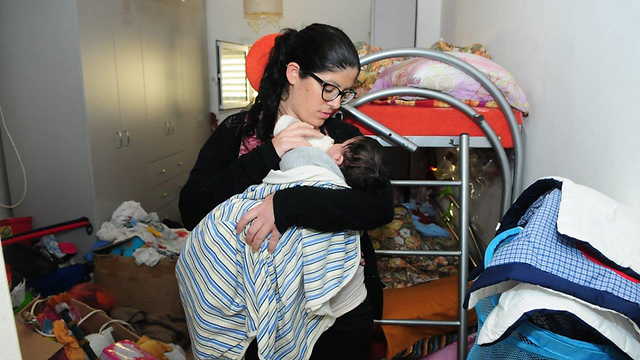How Israel's poor were lost between defense and politics
After report reveals 1.6 million Israelis live below poverty line, Alalouf Commission chair says government must act immediately; single-parent mother: 'Country does not take care of poverty or the poor.'
Omri Efraim
|
"I do not need a poverty report to know that the three jobs my husband and I work do not pay enough to survive. We are fighting for food and clothing. They say there are tough security situations in Jerusalem? The war is first and foremost inside the home: how to survive, how to live, how do I feed my kids." - Iris Umgazin, a 47-year-old mother of five from Jerusalem
Israelis shared their stories of steep poverty after a National Insurance Institute report revealed on Tuesday that 1.6 million people lived below the poverty line. The government body tasked with improving the situation, the Alalouf Commission, has disappeared in the past six months – as the budget battle worsened and the governing coalition collapsed.
"If the state does not act immediately to change the situation, the poverty rate will increase and Israeli society will not be able to develop properly," warned Eli Alalouf, the chairman of the committee.
Man begs for donations (Photo: Gil Yohanan)
His eponymous commission reported its conclusions last June, but they were abandoned in short order, with the kidnapping of three Israeli teens and a war with Hamas in Gaza topping the headlines. Regardless, the majority of its recommendations, intended as the flagship of Prime Minister Benjamin Netanyahu's war on poverty, were buried.
The commission members formulated a series of steps, estimated at 7.8 billion shekels per year, but quickly cut the figure to 1.7 billion during the arduous process of settling on the 2015 State Budget.
However, because of the snap elections and the fact the budget was never passed, even these meager steps were abandoned – leaving the war on poverty toothless and penniless.
Alalouf enumerated a series of essential steps which were formulated by the commission's experts, including massive investment in education, welfare, and healthcare infrastructure. "Without such investment, the state and society in Israel will not be able to develop and halve the poverty rate within a decade, as recommended by the commission."
The commission chairman stressed that there was a need "to increase dramatically the number of apartments under public housing and the extent of the rental assistance provided to the needy, to raise pensions and to utilize rights like the negative income tax."
Homeless man in Tel Aviv (Photo: Motti Kimchi)
Other experts have disagreed with Alalouf's conclusions. Prof. Avi Simchon from the Hebrew University, who previously served as the senior economic advisor to former Finance Minister Steinitz, said there were more important measures that must be taken.
"The Alalouf Commission ran away from the central problems, like making core subjects mandatory, because it did not want to burn bridges," said the professor. "But it is an essential step and you cannot escape it. Without it the State of Israel will continue to be a state burdened by poverty," he said.
According to Simchon, the slight decrease in the poverty rate presented in the report was "the result of a one-time injection because of the increase in negative income tax payments in 2013. The prime problem of the Israeli economy was not fixed, and thus our poverty rates are nearly double those of the West."
The economics professor noted that the majority of the Israeli poor were in the haredi or Arab sector. "If the State of Israel will continue to let a quarter of the Jewish children in this country (the haredi community) stop studying core subjects at 13, the poverty rate will only continue to grow."
Shelly Margi, a 32-year-old divorcee and mother to three children, lives in Be'er Sheva. She lives from alimony payments of 1,800 shekels and unemployment – which was recently cut – of 1,200 shekels. "Only God knows how I survive."

Shelly Margi, from Be'er Sheva (Phtoo: Herzl Yosef)
She said her unemployment payments were recently ended because "they saw my ex-husband picking up the girls for school in the morning. I hope they give that money back."
Margi primarily relies on her parents and sisters, who help her purchase food and basic necessities. "I pay the girls' school for after-school activities even though I have no money and the debts are piling up. As long as they do not see the hardship in the house. I no longer sleep at night, and I can't go to work because of the (two-month-old) child."
"Only regular people ever help, not government agencies. To receive help you need an empty fridge, without anything. Only then do you receive assistance. I get help from strangers, who hear of my difficulties. The country does not take care of poverty or the poor."
She emphasized: "We are second-class. The country is ashamed of us. I have no intention of voting. One way or the other they will not help me, so why should I vote? This government only helps itself, not the people."
In an emotional interview, Margi said, "I do not want to be rich. I only want the minimum to keep my home running. I'm not even dreaming of a house. I live in a small, crowded apartment with three kids."
In a holiday season when many Israelis take their children to see a myriad of festivals, Margi says "I need to make a calculation: festival or food or clothing for winter. I cannot live like they do. But I do see the prime minister buys candle for thousands of shekels instead of helping the poor.